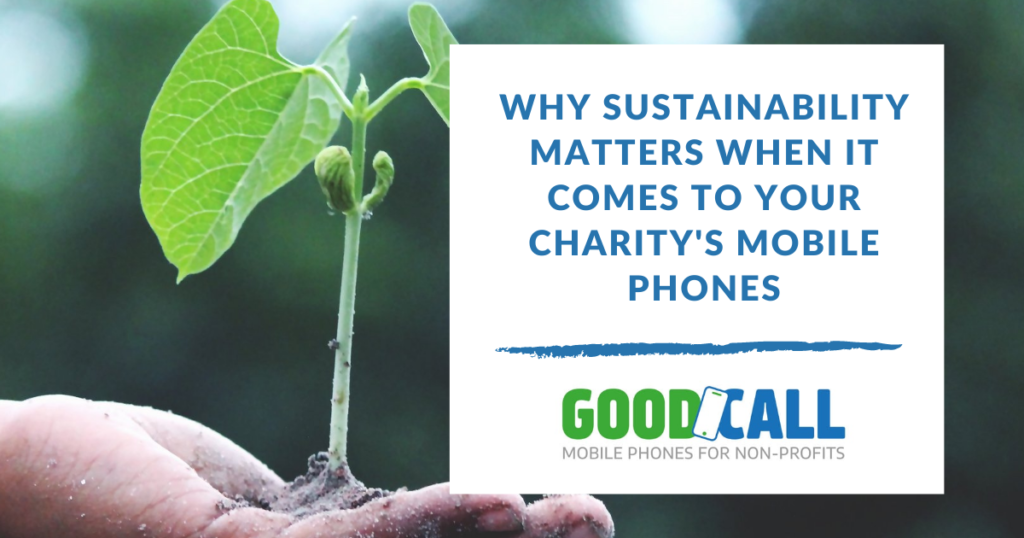
This month, with COP26 taking place, there have been many discussions in the charity space about how we can make the products and services we use more sustainable for people and the planet. Have you ever considered the environmental and social impact of the smartphone in your pocket? Here we dive into some of the innovative ways that smartphones are changing for social and environmental good and why sustainability matters when it comes to your smartphone.
There are as many as 60 elements in modern smartphones which include earth minerals, heavy metals and precious materials such as gold, cobalt and lithium. These are often mined in areas with unethical and unregulated mining practices, creating socio-economic and environmental effects on both people and the environment. The vast majority of a smartphone’s carbon footprint comes from the labour-intensive manufacturing process, from mining, and distribution. So why does this matter for your organisation and what steps can you take to make your mobiles more environmentally friendly?
Apple and Samsung made the headlines in recent weeks, by removing charging adapters from all their standard smartphone packaging, making the claim that the change will reduce carbon emissions. Here are some of the major movements that are working to make mobiles more sustainable:
Currently, the average smartphone has a working lifespan of only two years. Given the environmental and social cost of creating new smartphones, extending their operational lifespan is a way to reduce their damaging impact.
iFixit is a campaign group that fights for the right to repair and challenges widespread mobile industry practices which make it very difficult to reuse and repair handsets.
They campaign manufacturers and lobby for incentives to create repairable smartphones and overcome ‘planned obsolescence’. Planned obsolescence is a concept commonly seen in the mobile industry where handsets are built to fail after a specified period so that consumers keep coming back for more.
Refurbished phones are also a great affordable option for many charities that are trying to reduce their carbon footprint. After your phones have served their purpose, it is also possible to recycle them either through a recycling service or directly with the manufacturer. They can often be given a new life and go to someone else in need.
Manufacturer collection campaigns are now seen as a major way to reduce toxic electronic waste. It is hoped that this will make recycling the expensive internal components more profitable and viable for reuse. This creates a further incentive for mobile phone manufacturers and waste management operations to invest in the development of more effective recycling techniques.
The rise of the modular smartphone is another way that shows users are looking for environmentally and socially conscious handsets. These phones have components that can be used interchangeably when they need to be upgraded or repaired. A modular phone consists of the main board which components like the battery, camera and SIM card housing can easily be removed and reattached.
Many other phone models on the market can only be repaired by soldering and metalworking. That is something that is far out of reach for the everyday user. Modular phones can therefore reduce repair costs, extend the life of the phone and minimise electronic waste.
Fairphone is another smartphone manufacturer that is the pioneer of the modular phone movement. They strive to use ethically sourced materials in their phones and extend the lifespan of phones for end users. They also advocate for workers’ welfare, from mineral miners to manufacturers, at all points throughout production.
Many charities across the UK are currently accepting mobile phones and other technology equipment as donations. They will either use these phones as part of their project work or sell these devices back to providers as part of recycling schemes, a simple way to generate funds for their charity.
It’s important to remember that if your organisation is thinking of donating or recycling your handsets, it’s very important that they are completely wiped and restored to factory settings before doing so. This will make sure your data is not compromised and will keep you and your team’s information safe and secure. This handy guide from Google can help you clear your Android phone and this guide for iOS Apple devices.
When choosing the right phones for your charity consider the life span of the device, how it will be used and if it can be repaired easily or locally. Greenpeace have created a fantastic Guide to Greener Electronics to help you choose and compare the environmental and social performance of 17 different mobile manufacturers, assigning each an overall grade. This can be really useful as sometimes it is hard to know where to start when evaluating a phone’s eco-credentials. They compare companies based on factors such as energy use, resource consumption and the elimination of harmful chemicals and unsafe working practices. Apple and Fairphone are currently leading the way when it comes to the mobile industry becoming more green. We hope you found this helpful in your search for your next sustainable phone.
At GoodCall, we can support your charity to deliver impact through mobile solutions. We provide bespoke support and advice to help you make the most of your technology. We’re interested to hear your thoughts around making technology more sustainable, and the impact this could have for your charity. Get in touch with us here or call Elaine on 07535 396 882.